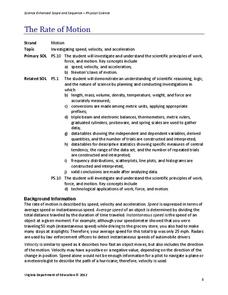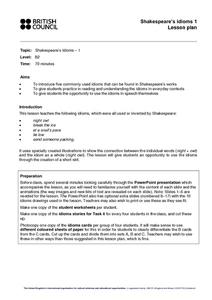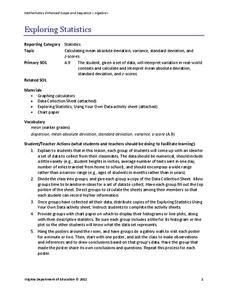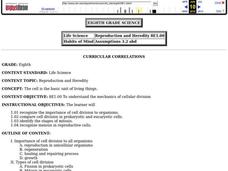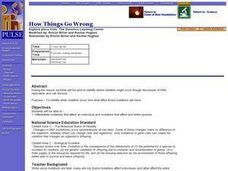Curated OER
How To Make an Artificial Organ
Students examine the advances made in technology with regard to prosthetics and replacement organs and limbs. They describe the anatomy and functions of different organs and create their own artificial organ. They defend and present...
Curated OER
Mollusks and Segmented Worms
Keep clam and read on! After reading the textbook selection about mollusks and worms in the additional materials section, your young zoologists check their comprehension by answering the questions on the handout found here. To...
Curated OER
A Simple Task Made Complex: Types of Sentences
Looking for a lesson about differing sentence types? Use this lesson on compound and complex sentences in your grammar unit. After composing simple, compound, complex and compound-complex sentences individually and as part of a group,...
Curated OER
Adding to the Picture: The 1963 March on Washington
Who do your scholars imagine when they think about the civil rights movement? If only a few faces come to mind, this lesson will expand their concepts of the movement's leaders. Learners examine an image of the 1963 March on Washington,...
Virginia Department of Education
Adding and Subtracting Polynomials Using Algebra Tiles
Scholars learn how using algebra tiles to add and subtract polynomials can model how to combine polynomials. They use their newfound knowledge to complete a worksheet of problems.
Virginia Department of Education
Multiplying Polynomials Using Algebra Tiles
Tiles are not just for algebra—see how they can help with multiplication too. Young mathematicians learn to use algebra tiles to model the multiplication of polynomials. A follow-up worksheet provides practice with the skill.
Serendip
Mitosis and Meiosis Card Sort
Cells divide by one of two processes, either mitosis or meiosis. Scholars sort cards into two sets, one representing each type of cell division. Then, they sequence the cards demonstrating an understanding of the movement of chromosomes.
Virginia Department of Education
The Rate of Motion
How much time does it take to jump over three balloons? Pupils calculate the speed of tasks that require different motions. They determine motions for tasks such as walking, skipping, hopping, and jumping before creating a spreadsheet...
British Council
Shakespeare’s Idioms
Lie low. Break the ice. He's a night owl. Idioms, in this case idioms created by Shakespeare, are the focus of resource that includes a PowerPoint presentation, an activity, and a brief lesson, all intended to give kids a chance to...
Virginia Department of Education
Exploring Statistics
Collect and analyze data to find out something interesting about classmates. Groups devise a statistical question and collect data from their group members. Individuals then create a display of their data and calculate descriptive...
5280 Math
Capture the Points
Play a game of capture the points. Young scholars receive a number line with specific points graphed and must write an inequality that captures all the points. The second task of the algebra project is to write an inequality with...
Teaching American History
Interpretation of the Declaration of Independence
Ready to interpret the Declaration of Independence and understand its meaning? The resource divides scholars into pairs, where they work as a team to match translations with excerpts from the declaration. The class then engages in...
City University of New York
Dutch New York
What patterns appear in the treatment of Jewish and Quaker immigrations to New Netherland? Your class members will work together to read and discuss the religious restrictions placed on immigrants to Dutch New York.
Curated OER
Differentiated Math
Fourth graders study a division algorithm. In this math lesson, 4th graders solve division problems using partial quotients. Students solve division problems and check their answers with the class.
Curated OER
The Product and Quotient Rules
In this product and quotient rules worksheet, students use Taylor's Theorem to rewrite functions in a given form. They determine the derivatives of functions. This three-page worksheet contains explanations, examples, and seven problems.
Curated OER
Reproduction and Heredity
Eighth graders study the importance of cell division, compare cell division in prokaryotic and eucaryotic cells, identify the stages of mitosis and recognize meiosis in reproductive cells.
Curated OER
Are Adult Pancreatic Beta Cells Formed by Self-duplication or Stem Cell Differentiation?
A case-study of Dr. Melton's experiment on pancreatic cells highlights this worksheet. Details of the study adorn the first three pages, complete with diagrams. Biology buffs then analyze the data and identify problems within the...
Scholastic
Study Jams! Proportions
Join Zoe and Sam as they use proportions to budget money for their Green Earth Club. Watch as they set up and solve a series of proportions using cross multiplication and division. A great resource that brings together prior knowledge of...
Curated OER
How Things Go Wrong
Students identify where mutations might occur and examine what effect those mutations will have through class discussion of DNA replication and cell division. Students then differentiate between mutations that affect individuals and...
Curated OER
AP Biology Lesson Outline
Ninth graders research the different field of bioengineering. In this biology lesson, 9th graders differentiate meiosis and mitosis. They discuss the pros and cons of using radiation in medical diagnostics.
Curated OER
Chemical Fun
Fifth graders observe and conduct a variety of experiments to differentiate between physical and chemical changes. They mix cabbage juice with different liquids and record their observations on a chart. Students write down their...
Cave Creek Unified School District
Crusades and Culture in the Middle Ages
The Crusades sounds like a glamorous time period in the Middle Ages full of glory—but was it? Scholars find and review the truth of the Crusades' influence on the world through the resource. The study guides, separated individually by...
Curated OER
Why can't We Use SSA to Prove Triangles Congruent?
Students investigate triangles and congruences. In this geometry lesson plan, students differentiate between inductive and deductive reasoning. They differentiate between similar and congruent triangles.
Curated OER
Media Stereotypes: How Differences Divide
Students differentiate between generalizations and stereotypes and compare and contrast gender representation. Finally, they critically analyze media for gender stereotypes. They look at magazines and create collages to focus in on the...









